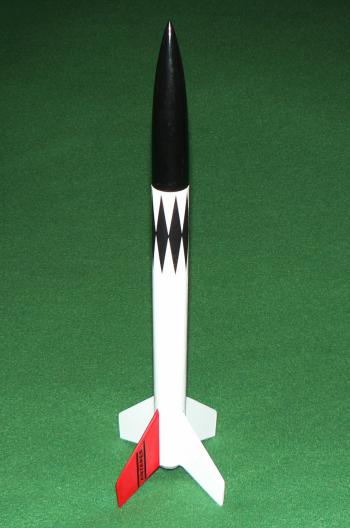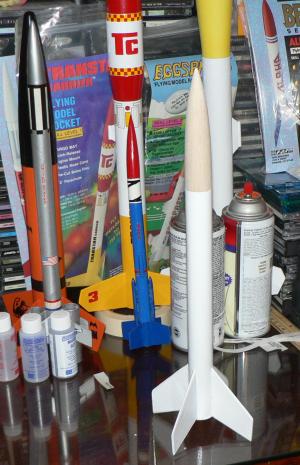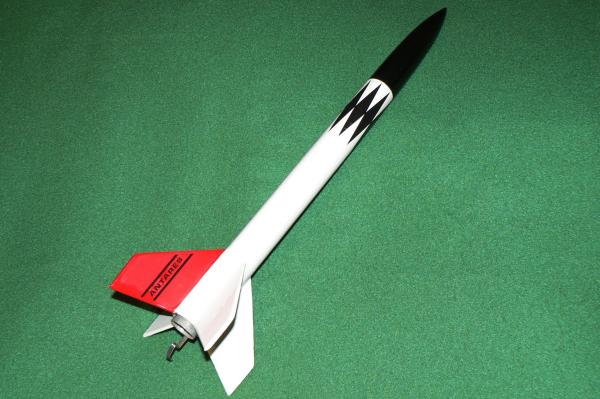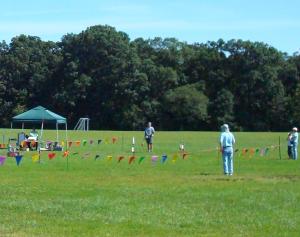| Construction Rating: | starstarstarstarstar_border |
| Flight Rating: | starstarstarstarstar |
| Overall Rating: | starstarstarstarstar |
| Manufacturer: | Estes  |
 (Contributed - by Duprey, Al - 10/28/08)
(Contributed - by Duprey, Al - 10/28/08) Brief:
This is an easy build for a 4 fin, single stage rocket.
It has good looks and nice lines to it. Some may find it too vanilla, but not me, it is one of my favorites.
Construction:
I first got the plans from Rocketshoppe (HERE)
I prefer the Adobe PDF format. They just are easier to print and get the correct scaling. It is built from a BT-50W body tube. I had extra 18" BT-50 laying around.
I purchased a balsa nose cone from Semroc item # BNC-50Y.
The cone was nice quality, smooth, no dents or dings. No plastic here.
I also bought a 18mm engine mount kit to fit the BT-50.
I bought the decals from Excelsior Rocketry.
The rest of the parts, launch lug, Kevlar® thread #150, 12" Parachute, #14 Snap Swivel (use for fishing), piece of rubber band and Midwest brand 3/32" balsa fin stock bought from Michael's crafts.
I have these smaller parts laying around from other kits and purchases.
Also needed, Exacto knife, CA, Yellow wood glue, MicroScale Industries film/set/sol, multi grits of sandpaper, Nail file, long Q-Tips, Blue painters tape, Bowl, warm water, drop of dish soap, foam brush and Pine-Pro Sanding sealer. (water based, non-toxic)
Very easy instruction to follow. I started by putting blue painters tape around both sides on the line marked to cut the tube to 9 1/2 inches. Make sure your Exacto knife is sharp, sharp, sharp. I slowly go around the tube starting lightly and then pressing hard after 5 or so revolutions. (As an aside, is not it interesting how many 9 1/2" rockets there are, just big enough so you cannot get 2 bodies out of on 18" tube).
I always wick CA into the body tube and use a long Q-tip (get from Doctor's office) to make the inside smooth and not have any ripples or high spots. This adds strength and not much weight. Helps stop zippering and creasing on those hard landings. Make sure the window is open... Smile.
After the CA hardens it is very easy to use a large medium course nail file to make the cut end even all around the tube. I always use the cut end on the tail end. That way you are sure to have a smooth nice opening to accept the Nose Cone.
I cut the fin template out and traced it onto some 3/32 balsa wood stock.
 Again have a sharp Exacto blade. I use my Dremel to put a good edge on the Exacto after about ever 10th
cut or if I notice it dulled quickly.
Again have a sharp Exacto blade. I use my Dremel to put a good edge on the Exacto after about ever 10th
cut or if I notice it dulled quickly.
I sand and round all but the root edge.
I mark the BT-50W with my handy little yellow Estes tube marking tool. Then extend the line with the other yellow Estes V shaped line drawing tool. If you sand down a pencil it will fit into the hole and allow you to mark perfect circles on the tube. I do this so the top of the root edges all line up. Next is a thin amount to CA on the root edge of the fin. Then hold in fine place. The CA I use sets up in under one minute.
So eyeball it down the body tube for straightness and make sure it is perpendicular at a 90 degrees from the tube.
I just use the CA to tack the fins in place, then I use Elmer's wood glue to make the fillets. I put from 3 to 5 layers so that when done there is a slight curve of glue where the fin meets the BT. A damp finger and an old rag come in handy here. I let that dry overnight.
I do the same with the launch lug, there is almost no indent on the side where the launch lug meets the BT. Take your time and make it smoooooth.
I assemble the motor mount kit, this is simple, but I add one step. I create a small grove in the inner most Adapter Ring, this allows me to tie
A piece of Kevlar® thread #150 to the middle of the engine tube and follow up in the grove just made and this way you can avoid the traditional tri-fold shock cord attachment. I find the Tri-fold often gets in the way of parachute / streamers deploying. I paint the expose end of the engine mount silver. So it looks like a chrome tip from a car's exhaust pipe.
I do not glue the engine mount until after painting is complete.
On to the filling & paint....
Finishing:
I use water soluble pine wood derby filler for all exposed Balsa.
The filler is thin by a 4 to 1 ratio. I use a regular Q-tip here.
Sand in between coats. The filler dries in about an hour, depending on how thin you spread it.

Once all is smooth I put 2 light coat of Ace Gloss Black on the nose cone, paint the entire body Ace gloss white. I use old news papers rolled in a tight cone that fits into the BT-50. Since the engine mount is not in I can put the cone into either side with easy. Again 2 light coats, the first light coat is almost a mist. I find that if you are planning on putting on other colors that a base coat of gloss white makes them snap and jump out at you. I put a third heavier coat on last, this brings out the gloss. I allow about an hour between coats. I find the second and last coat adhere better if the bottom coats are just a bit tacky.
After drying I Blue taped off all but the one fin opposite the Launch lug. I paint it Ace Gloss Red, 3 coat, just like before.
I like Ace gloss White, Black, Red spray paint gives best results for me. The ace brand has a different type of spray button (better for arthritic fingers) and the spray pattern is not round like most sprays, but it is up and down and allows you to be more accurate and have less blow bye.
When the paint is totally dry, I apply Microscale - Decal Film to the
Excelsior Decals. This makes them a little tougher when applying them.
It reduces the number of "Oh Darns". After decal dry cut them out. Again use sharp scissors, cut close to the decal as you can safely get with out cutting into the decal. Get a bowl of warm warm water with 1 drop of dish soap in it. Apply Microscale Set to the spot you will be putting the decal. Put decal in the water for about 10 to 30 seconds.
Warmer water make this go faster. Slide the decal off the backing paper to the spot you want it. I use a wet Q-Tip to move the decal around if needed. After applied I leave it overnight. The next day inspect your decals for ripples or raised edges. Use Microscale Sol to flatten out a raised decals. Be very careful here. The Sol weakens the decal. So be gentle and take you time.
When happy with decals I use Future Floor polish and a foam brush to seal the decals to the rocket to protect them from drops, scrapes or lawn darts.
Construction Rating: 4 out of 5
 Flight:
Flight:
Went out to Acton Mass. for a CMAS launch on Aug 23. Great day, good turn out. I put a lot of work in this so I only
put an A8-3 in it.
Filled out my launch paper work, waited for a pad assignment.
There was a slight wind so I angled the rod to about 80 degrees into the wind. It has a good size parachute for a smaller rocket with no hole in the middle. Loaded the rocket and attached the alligator clips. Stepped back and let the launch controller take over. 3 - 2 - 1 and off she went up.
Recovery:
Was a pretty straight launch and after the 3 second delay deployed the parachute and spit out the wadding. It caught
some wind and landed a good 50 yards to the left of the launch circle. I was happy that there was no damage, no
zippering.
I will now put her up on the shelve to be admired.
Flight Rating: 5 out of 5
Summary:
Pros: Nice little classic kit, was able to make out of mostly spare parts.
Cons: All finished and have to move onto the next kit.
Overall Rating: 5 out of 5
Other:
Great looking lines on this bird. Make sure you have a good smooth coat of Gloss White on her. The diamond roll
pattern from Excelsior fit beautifully. Just take you time, and by all means use the micro film/set/sol.
Sponsored Ads
 |
 |











